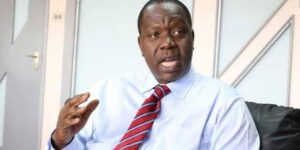In a publication by Daily Nation, Dr. Fred Matiang’i’s recent comments on the brutal killing of Albert Ojwang have stirred national outrage but not just for the reasons one might expect. While Matiang’i called the murder of the teacher and blogger “cold-hearted” and used it to push for reforms in the police and justice system, many Kenyans see his remarks as deeply hypocritical.
This is the same man who, not long ago, served as Interior Cabinet Secretary during a period widely remembered for horrific extrajudicial killings, torture, and widespread human rights abuses.

The then interior CS Fred Matiang’i. Photo Credit | File
His sudden concern for justice now feels more like a political gimmick than genuine advocacy, especially with his eyes reportedly set on the presidency in 2027.
Matiang’i’s time in office was not just controversial it was terrifying for many families who lost loved ones under unexplained circumstances.
One of the most horrifying incidents linked to his tenure was the discovery of over 30 tortured bodies dumped in River Yala. These were not accidents. The bodies showed signs of torture, acid burns, and mutilation.
Amnesty International and other rights groups cried out for answers, but nothing was done. Matiang’i was in charge, yet no one was held accountable.
Instead, the killings became part of a grim pattern that many Kenyans came to associate with state-backed terror.
When Matiang’i now stands to condemn the killing of Ojwang, it feels more like a calculated move than a genuine expression of concern. Albert Ojwang was taken into police custody over a social media post and ended up dead, with an autopsy confirming he was tortured and strangled.
His death has been met with protests and public fury, as people chant for justice and an end to police brutality.

Slain Activist Albert Ojwang. Photo Credit/ Cyprian NyakundiX
But for Matiang’i to join the voices of outrage is not only ironic it’s insulting. He was once the face of the very system that turned police cells into death traps.
The situation becomes even more troubling when you consider that Matiang’i has not taken any responsibility for what happened during his leadership. The Yala bodies, the disappearances, and the murders have never been addressed.
His silence was deafening back then, and now his voice rings hollow. Many Kenyans believe his sudden call for reforms is only because he wants to clean up his image before the 2027 elections.
He wants to look like a reformer, but he carries the stains of a bloody past that no public statement can wash away.
The killing of Albert Ojwang should never have happened, just like the killings in Yala and many other places across Kenya during Matiang’i’s time.
But for Matiang’i to pretend to be a defender of justice now is an insult to the victims he ignored. Instead of speaking out, he should be answering tough questions about what happened under his watch which.
Justice is not about who shouts the loudest after a tragedy it’s about who stands for the truth when it matters. Matiang’i failed to do that when he had the power. His track record speaks louder than his words.



